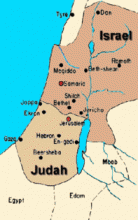In chapter 20 of Second Samuel, the House of David goes to great lengths to quell any further civil unrest between the people of Judah and the rebelling elements of Israel. David isolates his ten concubines in the very definition of a gilded cage, a clear indication of some perceived taint caused by Absalom and a meaningful reference to David's own disastrous romantic decisions. David also sends Joab, his most trusted lieutenant, to deal with any betrayers who would replace Absalom as a new champion of the kingdom of Israel. Directly following Absalom's defeat in the forest of Ephraim, the people of Israel maintain a vocal opposition to the rule of Judah, though they don't take up arms. Sensing a new rebellion in the making when Amasa, one of David's advisors, fails to organize the leaders of Judah following the rise of a popular dissident named Sheba, David orders the death of Amasa and the pursuit of Sheba before further trouble can arise. In this chapter, David's justice is swift, brutal and designed to shock the Israelites into submission.
When such large political maneuvers show up in biblical texts, it is valuable to look into the factual history surrounding them. The Bible is not meant to be a 100% true historical document, but as a catch-all text of a culture it often combines the recording of history with the moral lessons at its core. If we are to appreciate the full extent of what the book has to offer, we must compare and contrast the sentiments therein with the hard evidence provided by archaeology.
As far as the Books of Samuel are concerned, the central conflict of Israel and Judah began as a unification effort against Philistine invaders, then evolved into an internal dispute between two Jewish cultures that considered themselves ethnically distinct. The time scale of the true Iron Age societies of Israel and Judah suggests something else entirely. It's not likely that two equally matched kingdoms coexisted in the region, but that the southern Judah resulted from the conquest of the northern Israel by the Assyrian Empire in the 8th Century BCE. The Assyrians made it a habit to repatriate conquered peoples and replace them with populations that were more immediately sympathetic to Assyrian culture. The Israelite population migrated south to Judah where its large numbers allowed villages like Jerusalem to flourish, developing into major cities.
The biggest difference between the cultures of Israel and Judah was the comparative lack of social cohesion in the former. The pre-Assyrian society of Israel was not particularly unified and it didn't practice a standardized form of Judaism. The southern kingdom of Judah was a bit more centralized and considerably more concerned with monotheistic purity. The conflict described in the Torah is first and foremost a war of competing ideologies. That the version of the story that eventually got recorded described a victory for the holy contingent suggests that the real internal conflict between Israel and Judah was a cultural one, not a war of swords.
It's startling to realize that, had the solidly monotheistic society of pro-Davidian Jews not dominated Judah, Jewish culture may very well not exist. When the Babylonian Empire conquered Judah, the Hebrews in captivity wrote much of what we know today as the Torah. It was their attempt to preserve the culture they had established in Judah, a culture that would one day evolve into international Judaism.
